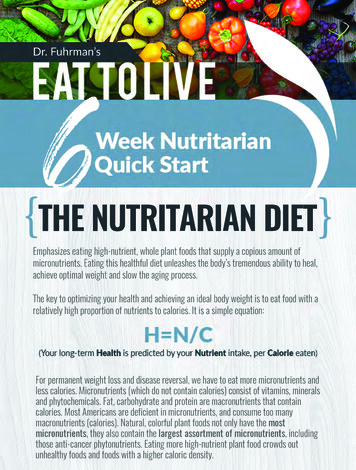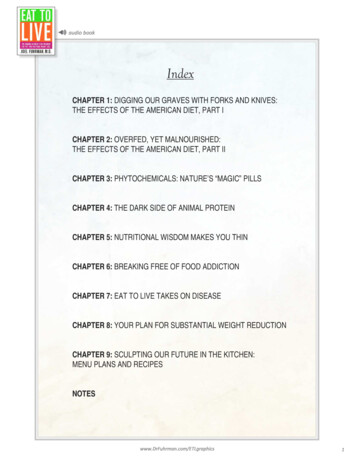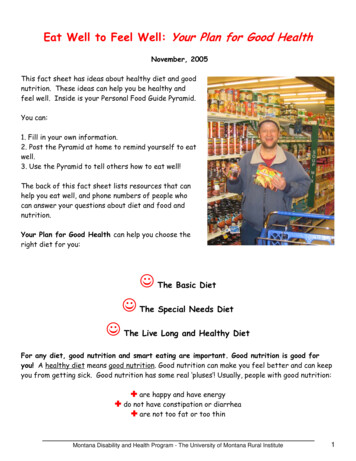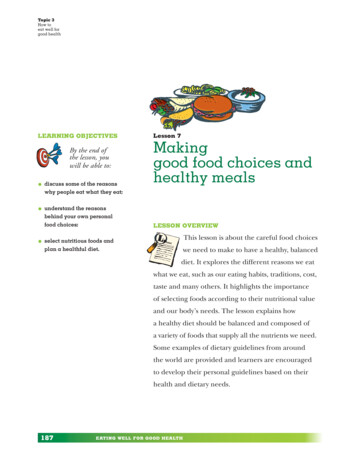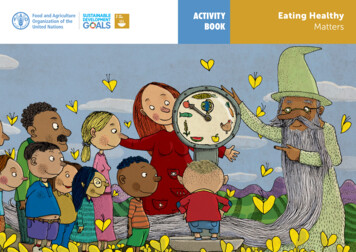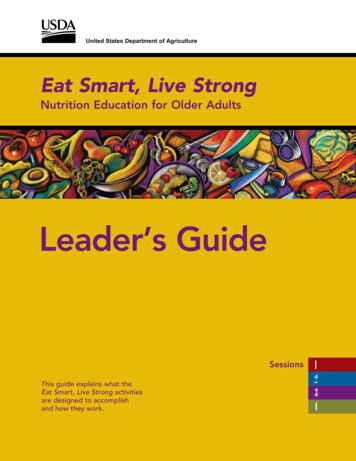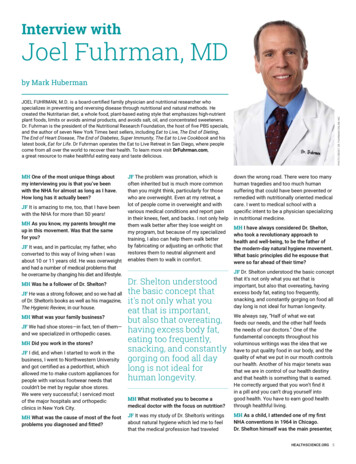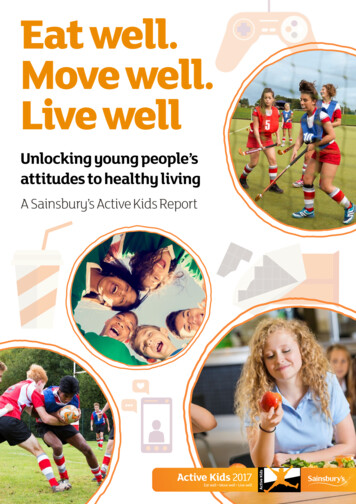
Transcription
Eat well.Move well.Live wellUnlocking young people’sattitudes to healthy livingA Sainsbury’s Active Kids Report
Eat well. Move well. Live well Unlocking young people’s attitudes to healthy livingForewordThere is considerable evidence that the UK’s children areliving increasingly unhealthy lifestyles, for a number ofreasons, including the rise of social media, the increasedavailability of cheap fast food and the move away fromhome cooking.At Sainsbury’s we want to help young people in theUK lead healthy, active lifestyles. We commissionedthe ‘Eat well. Move well. Live well’ Report to delveinto the current issues surrounding young people’sattitudes to their nutrition, health and fitness anddraw attention to how we, as a society, can worktogether to tackle some of these issues.The report focusses specifically on the 11-14 year oldage group as this is the time when children makethe transition from primary to secondary school,becoming increasingly independent and with morefreedom to start making their own decisions aboutwhat and when they eat and the exercise they do.Through our work with a number of health industrybodies, such as Public Health England and UK Active,this was identified as a particularly vulnerable agegroup and a critical tipping point that can determinefuture relationships with food and nutrition. Ourresearch identified that having greater freedom tomake decisions without the proper information atthis age can lead to poor judgement – skippingmeals, cutting out food groups, eating junk food andnot doing enough exercise - despite the majority ofchildren thinking they’re living a healthy lifestyle.Our commitment to improving children’s healthis well-documented. The Sainsbury’s Active Kidsprogramme, now in its thirteenth year, donatesmillions of pounds worth of equipment andexperiences to UK schools and kids’ clubs around theUK.We also continue to look for long-term ways toimprove children’s health and well-being. Between2011 and 2015, we reduced salt in own-brand productsby nearly 14%. In both 2014 and 2015, we removedover 2,370 tonnes of sugar from our own-brand softdrinks and in 2016, we reduced the sugar in ourown-brand cereals by 452 tonnes, an average of 13%across the range (far exceeding the Government’stargets of a 5% reduction by the end of 2017). We’vecalled on the Government to introduce mandatorytargets across a level playing field of retailers,manufacturers and the food service industry to helptackle obesity.We will use the findings of this research to evolveour Active Kids programme from 2018 and help uscontinue to progress towards responsible measuresthat help young people and their families eat well,move well and live well.Judith Batchelar, Director of Sainsbury’s Brand2
Eat well. Move well. Live well Unlocking young people’s attitudes to healthy livingKey FindingsWith an increasing number of young people classified asoverweight or obese1, the Sainsbury’s Eat well. Move well.Live well Report explores the attitudes of 2,000 11-14 yearolds2 from across the country towards exercise and nutrition.More children in the UK are leaving primary schooloverweight or obese than ever before3; teenagers inEngland drink more sugar-sweetened drinks thananywhere in Europe4, consuming three times theofficial recommendation for sugar5. Judging bythese facts, it would be easy to conclude that theUK’s young people have little interest in living ahealthy lifestyle, but this new study shows it is morecomplicated than this.The findings uncovered a strong desire among theUK’s 11-14 year olds to be healthy. In fact, 84% ofyoung people surveyed believe that being healthy isimportant and are aware of the steps they should betaking to lead a healthy lifestyle, with most of thosesurveyed demonstrating a good sense of how to behealthy.However, the research also reveals a contradiction.While many young people believe their lifestyleis healthy (69%), they are not doing enough toactually achieve this. This includes not exercisingenough, not eating enough fruit and vegetables andnot attempting to control the amount of sweets,chocolate or fried food they consume. This is despitefindings that show they know it’s important to: Maintain a balanced diet (95%) Eat their 5-a-day (95%) Have an hour of exercise a day (93%) Get enough sleep (91%) Drink 6-8 glasses of water (87%)3
Eat well. Move well. Live well Unlocking young people’s attitudes to healthy livingEating wellWhile most of the young people surveyed demonstrated asound understanding of why they should eat healthily, thereis plenty of room for improvement when it comes to theirdiet and daily routine.Most young people want to eat wellThe good news is that most of the children surveyedunderstood the importance of healthy eating. Themost common reasons for wanting to eat wellrelated to health and fitness, with 55% saying that itis important to eat well in order to feel healthy and36% saying a nutritious diet is important to avoidbecoming ill.Body image was another factor. One in three (36%)11-14 year olds say eating well is important to helpthem manage their weight, with 15% believing itcould help them look more attractive.Notably more girls than boys stated reasons relatingto their appearance as motivation for healthy eating:43%28%Girls see eating well asmore important to helpmanage weight than boys37%17%However, a significant proportion of young peoplesimply do not understand the importance of eatingwell, suggesting a lack of clear information aroundthis topic and presenting a red flag for their futurehealth and lifestyle choices.13%21%31%don’t think it’s important to eathealthily when you’re youngbelieve eating fast food can helpkeep you healthyjust don’t think about whetheror not their food is healthy“I would say that I’m quite an activeperson but my diet isn’t that good.”Talia, age 13, BuckinghamshireGirls believe eating well ismore important for havinggood skin than boys4
Eat well. Move well. Live well Unlocking young people’s attitudes to healthy livingJunk food is still a preferenceFavourite snacksWhile having a treat every now and again will not doany harm, it is important that the intake of fast foodis carefully regulated for a balanced diet. Althoughmost young people surveyed recognised a range ofincentives for eating well, eating habits among thisage group are not as health-conscious as they shouldbe, with junk food often favoured over more nutritiousoptions.When snacking on the go, crisps are by far the mostpopular choice, with cereal bars and fruit only cited by11% of children as an option they would consider.There was no notable difference between theattitudes of those from a variety of socio-economicbackgrounds, with 26% of ABC1 children believingthey eat healthily most of the time compared to 19%of C2DEs, which is possibly not the outcome thatwould be expected. Children from both backgroundsadmitted to favouring crisps as a snack over fruit.In total:71%do not limit the amount ofsweets or chocolate they eat27%Over a quarter of childrenhave a fizzy drink withtheir evening meal54%Over half will onlyoccasionally or never limittheir intake of fried foodWhat are you most likely to snack on?(% of respondents)Packet of crisps30%Chocolate bar24%Bag of sweets14%Cereal bar11%Piece of fruit11%“It was when I turned 12 and that Iwas first on the GB team that I trulybegan to understand what I waseating affected my performance.the following foodsyou ableto cook?IWhichwasoffortunatetoarehaveplenty(% of respondents)of guidance from professionalsCheese on allowedtoastwhichme to gain a well – 67%rounded understanding of nutrition51%Basic pasta dishfrom a young age – somethingIPizzahopeI can pass on as an Active 48%topping*Kids ambassador. It is throughScrambled egg / omeletteSainsbury’sprogramme that we 46%cancontinue to educate young36%Cake or breadpeople on the importance of making11%Rice dishhealthylifestyle choices.”Ellie Simmonds OBE, British ParalympicSwimmer and Sainsbury’s Active Kids BrandAmbassadorWhy do you exercise?(% of respondents who say they do a lot of exercise)Enjoy being active81%Want to be healthy56%Gives me more energy42%Joining in with friends30%5
Eat well. Move well. Live well Unlocking young people’s attitudes to healthy livingWhat prevents children from eatingwell?Healthy food is seen as dullMany believe healthy food simply does not taste asgood as unhealthy options, with 34% saying taste ismore important than nutritious value. There is also acommon misconception that healthy food is boring;31% say this stops them from eating more healthily.Fast food seen as cheaperFinancial motivation plays a part in the decisionto opt for less healthy options; 13% say it’s cheaperto buy fast food when out and about, compared tohealthier options.Parental influenceChildren are more likely to take their cues on eatingwell from their parents (65%), than from school(57%). However, it can sometimes be the case thatparents may be misinformed about what constitutesa healthy diet or weight for their child. Recentresearch found almost half of mothers (48%) and43% of fathers said their obese child was about theright weight6.Misinformation from social mediaThe research found that nearly a quarter (21%)of young people refer to social media, YouTubestars and bloggers to find information on healthyeating. This is potentially concerning as vloggers,Instagrammers and other social media “stars” arenot qualified nutritional experts and as such theiradvice is not monitored, so can be misleading orsimply wrong. For instance, 44% of young peoplethink that cutting out a food group (e.g. gluten ordairy) can create a healthy lifestyle. This increases to50% among social media users.Skipping mealsAs well as the quality of food young people eat,having regular meals and not relying on snacks tofill up is essential for good health. Despite the healthrisks of not eating often, it was found that someyoung people are regularly skipping meals. On a typical day, 14% of 11-14 year olds skip atleast one mealIn fact, one in five believe that skipping meals caneven be a positive contributor in a healthy lifestyle.Young people become more likely to skip meals asthey enter their teens; the study found that more14 year olds skip meals than 11 year olds (probablyas they become increasingly independent withless parental supervision), with breakfast the mostcommon meal skipped. 18% of 14 year olds said they skipped breakfastyesterday compared to 7% of 11 year oldsThe research also found young people commonlyneglect other areas that contribute to a healthyroutine, such as drinking enough water and gettingenough sleep.51%rarely or never drink 6-8glasses of water a day21%rarely or never have ninehours of sleep7“Obesity is a very complex issue.While it’s great that so manyteenagers rate their health so highly,the fact that they still eat the wrongfoods and think that skipping mealsis the answer, shows that we havea lot of work to do. Active Kids is aterrific way of encouraging healthyeating and healthy activity.”Rosie Boycott, Chair of the London Food Board6
Eat well. Move well. Live well Unlocking young people’s attitudes to healthy livingLearning to cookWhat are you most likely to snack on?(% of respondents)Among the 11 to 14 year olds surveyed, most said that parentsPacket ofcrispsmadetheir meals, with only30%a third of the children preparing24%children do not necessarilyChocolateatbar least one meal a week. Whileneed to cook at this age, their14% future health depends on themBag of sweetsdeveloping these skills before they leave home.Cereal bar11%Piece of fruitWhatcan young people cook?11%Unfortunately, the findings reveal limited cookingskills among young people with nearly half of 11-14year olds (49%) admitting they are not able to cook asimple pasta dish.Which of the following foods are you able to cook?(% of respondents)Cheese on toast67%Basic pasta dish51%Pizza topping*48%Scrambled egg / omelette46%Cake or bread36%Rice dish11%“My dad always let me help withcooking and my nan used to bake alot. As a small child I was always inthe kitchen, so by the time I was ateenager, I was cooking on my own- homemade soups and salads weremy main meals.”Lucy Bronze, Football Player for Manchester Cityand England and Sainsbury’s Active Kids BrandAmbassadorGender disparitiesThere is evidence to suggest gender bias in cookingwith girls having stronger cooking skills than boys,revealing a particular need to focus on getting moreboys into the kitchen at a younger age:36%However, there are encouraging signs that children’scookery skills improve within the first three yearsof secondary school, with the percentage of youngpeople describing their cooking skills as good or veryWhy do you exercise?goodrising by 15% from the age of 11 to 14.(% of respondents who say they do a lot of exercise)Enjoy being active81%Want to be healthy56%Gives me more energy42%* usinga readymadebase and adding the toppingJoiningin withfriendsWant to look good30%26%47%21%A greater proportion ofgirls describe their cookingskills as good or very goodcompared to boys24%Nearly twice as many girls saythey can bake a cake or makebread compared to boys7
Eat well. Move well. Live well Unlocking young people’s attitudes to healthy living“I’ll admit, between my mum andmy sisters, I didn’t get much chanceto cook, I was however in chargeof washing up!! I was 7 years old, Ithink, when I helped cook my firstmeal, but properly began cookingfor myself when I started living onmy own at 18 years old.”“My dad’s parents died when he was15, so now because he can’t cookwhenever my mum is ill we alwaysjust order fast food. So I think it’sgood to learn to cook when you’reyounger because it will be useful,and it gets harder to learn whenyou’re older.”Jonnie Peacock MBE, British Paralympic SprintRunner and Sainsbury’s Active Kids BrandAmbassadorRachel, age 11, SurreyWho teaches young people to cook?Parents play a significant role in teaching theirchildren to cook; 83% of children say that it is theirparents who taught them how to cook, compared toonly 52% learning at school. This sets those childrenwhose parents cannot cook at a disadvantage. Animportant emerging source of information on how tocook is YouTube, which one in ten children said hashelped them.“I was able to start understandingfood and got a knowledge of whatwas in the food I ate simply bygetting involved in cooking at home.I cooked with my grandmother fromthe age of three and food has alwaysbeen a big part of my life ever since.We had home cooked humble Britishclassics with veg that we would growourselves – keeping it as natural andnutritional as possible. The processof creating dishes, cooking with yourfamily and understanding food is soimportant for us all as we grow.”Luke Thomas, who became the youngest HeadChef in the UK in February 2012, at the age of 188
Eat well. Move well. Live well Unlocking young people’s attitudes to healthy livingKeeping activeWhat are you most likely to snack on?(% of respondents)Packet of crispsChocolate barMany young people are not active enough, withBag of sweetssedentary lifestyles and a lackof understanding ofbarhow much exercise they needCerealholdingthem back fromachieving basic fitnessPiece of fruit levels.Children are not getting enoughexerciseAn active lifestyle is fundamental in maintaininghealth levels at any age. Sadly, British children areamong the least active in the world, and fitnesslevels are plummeting.One of the fundamental problems is that childrenthink they are doing enough exercise, when actuallythey are not meeting the recommended level8.While over half of children surveyed claimed theydo enough exercise to be healthy, 30% are onlyexercising once a week in school and 28% do notexercise for an hour or more on any day out ofschool.79%of those who consider theirlifestyle as healthy do not do anhour of exercise a day30%24%14%11%11%“It is vital that all children haveaccess to a varied and inclusivephysical activity offering outsideWhichof the followingare youthemable to cook?ofschooltimefoodsto help(% of respondents)maintain the CMO’s physical activity67%Cheese on toast of achieving 60 minutesguidelinesof moderate to vigorous physical 51%Basic pasta dishactivity each ed egg / omeletteIncentivesto exercise46%Cake orbread many young people are not doing 36%Eventhoughenough physical activity, it was found that 81% of11%Rice dishthose who exercise a lot do so because they enjoy it.Girls who like to exercise were more likely to say theyare motivated by looking good, while boys are moreinfluenced by celebrities and sports stars.Why do you exercise?If they remain unaware ofwhat “enough” is, they willlikely make no proactivechanges to their routine,putting themselves inserious danger of becomingoverweight.(% of respondents who say they do a lot of exercise)Enjoy being active81%Want to be healthy56%Gives me more energy42%Joining in with friends30%Want to look good26%9
Eat well. Move well. Live well Unlocking young people’s attitudes to healthy livingWhat puts children off exercising?Of course, not all children naturally enjoy keeping fit.When asked what prevents them from doing moreexercise, it was found that a large proportion finds itboring and over a quarter don’t think they are goodat it.30%26%think exercise is boringdon’t think they are anygood at sport48%43%would simply rather bedoing other thingscited bad weather as adeterrentOne in ten said they feel it is not important toexercise when you’re young, which rings alarm bellsfor the future health of these young people.Social media and gaming are significant factorscontributing to this sedentary lifestyle. It was foundthat:63%75%of boys play video games daily(compared to 29% of girls)of girls use social networks daily(compared to 57% of boys)The use of social media grows significantly amongolder children within this age group, with 59% of 14year olds using Instagram compared to 34% of 11year olds. Similarly, 56% of 14 year olds use Snapchatcompared to 31% of 11 year olds. The danger is thatas they spend more time on their mobiles or otherdevices they spend less time being active.“Movement has been stripped out ofmodern living, meaning GenerationInactive are driven to school and feda staple diet of sofa play and screentime, while being starved of outdooractivities.”Dr Steven Mann, Research Director at not-forprofit health body, UK Active10“I think I should do more exercise, Ijust can’t be bothered.”Francesca, age 13, BuckinghamshireIncreasingly sedentary lifestylesSitting in front of a screen is an inevitable part ofmodern life for today’s young people, with officialfigures showing that five to 15 year olds spend anaverage of nearly 14 hours watching TV per week and15 hours online9.10
Eat well. Move well. Live well Unlocking young people’s attitudes to healthy livingWhere do we gofrom here?In offering extensive insights into the attitudes of youngpeople towards living and eating healthily, it is hoped thatthis report will prompt discussion amongst parents, teachers,children’s health professionals, and all those with an interest intackling children’s inactive lifestyles and poor diets.While it is not surprising that today’s young peopleare spending increasing amounts of time on socialmedia, and that this is contributing to poor health,it is important that this fact is highlighted beforeit becomes widely accepted that children do notmove as much as they used to. The same goes forthe report’s findings relating to young people’sunhealthy eating habits and poor cooking skills; wemust find solutions to ensure these trends do notbecome the new normal in society.“Helping young people to lead anactive life has never been moreimportant - this generation face acomplex mix of lifestyle challengesassociated with the digital age, fastfood and sedentary lifestyles. Play,sport and physical activity notonly impacts on children’s physicalhealth, but also their social andemotional wellbeing and in turntheir achievement in the classroom.”Food for thought for the futureCompulsory measured targets across all nutrients not just sugar - and mandatory traffic light labellingacross all food and drink products, should be part ofa holistic approach to tackle childhood obesity. Thisshould be combined with clear, consistent guidelinesfrom Government on portion sizes.Sainsbury’s has publicly committed to improvingthe healthy balance of customers’ baskets bylowering the prices of many every day fruit andvegetables. It has also made a number of changesto price promotions, including phasing out multibuy promotions on products such as confectionery,biscuits, soft drinks and crisps.Alison Oliver, CEO Youth Sport Trust11
Eat well. Move well. Live well Unlocking young people’s attitudes to healthy living“Obesity is a complex problem butit can be turned around if we allget behind the proven solutions.Sainsbury’s is one of manycompanies contributing to our ownHealthy Eating programme. Thishas three components: helping andinspiring shoppers to use nutritionalinformation on pack, spreading thelearnings as companies reformulatetheir products to be healthier andfinding the most effective ways toencourage healthy eating in theworkplace.”Joanne Denney-Finch, Chief Executive, IGDAlongside this, these behavioural insights will shapethe future of the Sainsbury’s Active Kids programme,which has 12 years credentials as a proactive,effective and sustained contributor towards thefitness levels of young people, with millions ofpounds of equipment already donated to schoolsand sports facilities.“It’s great to see Sainsbury’s ActiveKids going from strength to strengthin helping our future generationslearn healthy habits. With almost athird of children aged two to fifteenbeing overweight or obese, we haveto come together as a society todefuse the ticking time bomb. Whatkids eat, how they play and getactive are crucial life lessons.”Empowering young peopleWith clear evidence of the lack of understandingamong young people of what constitutes enoughexercise, and an enduring preference for unhealthyfood, there is an urgent need for more education forboth children and their parents about healthy eatingand living. Teachers, parents, the food and drinkindustry and the Government must increase effortsto empower young people to make the right choicesfor their bodies.Within the home, in particular, parents need to havethe skills and knowledge to teach their children tocook. This was a common theme among the athleteswe spoke to as part of the research, all of whomstated their parents’ influence in the kitchen as a keyfactor in their success. Even if young people do notwant to grow up to be sportsmen and women, thissupport is vital to their futures.“Encouraging children to participatein sport and to educate them abouteating well is a real passion ofmine. I helped in the kitchen from ayoung age and my dad and uncleswere professional footballers sothey taught me about the nutritionrequired for a professional athlete toperform at their best.”Daniel Sturridge, Football Player for Liverpooland England and Sainsbury’s Active Kids BrandAmbassadorSheila Mitchell, Director of Marketing, PublicHealth England12
Eat well. Move well. Live well Unlocking young people’s attitudes to healthy livingAppendices:About the research:Sainsbury’s commissioned Relish to survey 2,00011-14 year olds from across the UK, including arepresentative sample of regions, genders andbackgrounds. The research was undertaken inJanuary 2017.Qualitative research11 was carried out to gain adeeper understanding of children’s lifestyles.Quotes from the children interviewed are includedthroughout the report. Official public health bodiesand UK ambassadors for children’s sport were alsoconsulted.With thanks to the followingcontributors: Alison Oliver, CEO Youth Sport Trust Joanne Denney-Finch, Chief Executive, IGD Sheila Mitchell, Director of Marketing, PublicHealth England Daniel Sturridge, Football Player for Liverpooland England and Sainsbury’s Active Kids BrandAmbassadorFootnotes:Statistics on Obesity, Physical Activity and Diet, England 2016report12The age bracket of 11 to 14 was chosen as this is the time whenchildren make the transition from primary to secondary schooland have more freedom to start making their own decisionsabout diet and exercise3NCMP results published by NHS Digital, November 2016Brooks, F. et al (2010) Health Behaviours in School-agedChildren, cited in Government report, Childhood obesity: a planfor action, 20 January 20174 The Chalfonts Community College,Buckinghamshire Ellie Simmonds OBE, British ParalympicSwimmer and Sainsbury’s Active Kids BrandAmbassador Rosie Boycott, Chair of the London Food Board Lucy Bronze, Football Player for Manchester Cityand England and Sainsbury’s Active Kids BrandAmbassador Jonnie Peacock MBE, British Paralympic SprintRunner and Sainsbury’s Active Kids BrandAmbassador UK Active Esher Church School, Surrey Luke Thomas, who became the youngest HeadChef in the UK in February 2012, at the age of 18135Public Health England (PHE) research, September 2016, gov.uk6The Health Survey for England 2015, published by NHS DigitalNHS recommendations of at least 9 hours sleep for this agegroup7“The UK chief medical officers recommend that all childrenand young people should engage in moderate to vigorousintensity physical activity for at least 60 minutes every day”,Government report, Childhood obesity: a plan for action, 20January 201789Ofcom findings, November 201610Quoted in Guardian article, October 2016Two focus groups conducted with pupils of Esher ChurchSchool in Surrey and The Chalfonts Community College inBuckinghamshire, in January 201711
Eat well. Move well. Live well nlocking yong peoples attitdes to healthy living Eating well While most of the young people surveyed demonstrated a sound understanding of why they should eat healthily, there is plenty of room for improvement when it comes to their diet and daily routine. Most young people want to eat well
